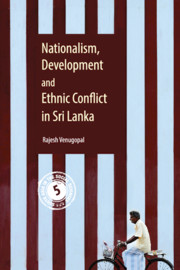Book contents
- Frontmatter
- Dedication
- Contents
- Figures
- Tables
- Preface
- 1 Nationalism, Development and Ethnic Conflict in Sri Lanka
- 2 Sinhala Nationalism
- 3 Kulaks to Clerks
- 4 The Politics of Market Reform at a Time of Ethnic Conflict
- 5 Military Fiscalism
- 6 The ‘Best and Last’ Chance for Peace
- 7 Cosmopolitan Capitalism
- 8 Sectarian Socialism
- 9 Conclusions: Elites, Masses and the Rajapaksa Presidency
- Bibliography
- Index
1 - Nationalism, Development and Ethnic Conflict in Sri Lanka
Published online by Cambridge University Press: 01 November 2018
- Frontmatter
- Dedication
- Contents
- Figures
- Tables
- Preface
- 1 Nationalism, Development and Ethnic Conflict in Sri Lanka
- 2 Sinhala Nationalism
- 3 Kulaks to Clerks
- 4 The Politics of Market Reform at a Time of Ethnic Conflict
- 5 Military Fiscalism
- 6 The ‘Best and Last’ Chance for Peace
- 7 Cosmopolitan Capitalism
- 8 Sectarian Socialism
- 9 Conclusions: Elites, Masses and the Rajapaksa Presidency
- Bibliography
- Index
Summary
Sri Lanka's civil war is over, but the nationalist ideologies that gave rise to it live on, and continue to define the parameters of a post-war future. At the end of the war in 2009, the government of President Mahinda Rajapaksa consciously prioritised economic development in order to rebuild and catch up. But development also served a larger purpose beyond physical reconstruction: economic growth and transformation, it was suggested, would address the underlying drivers of grievance. It would reintegrate the war-torn north and east, rebuild legitimacy for the state through service provision, and create new ground realities that would help to transcend the basis for the resurgence of a violent separatist threat.
At the inauguration of a new expressway in 2011, Rajapaksa explained: ‘Separatist tendencies will fade away when we have better road connectivity’. In that sense, post-war development contained not just an economic purpose, but also functioned as a project of ersatz conflict resolution. In lieu of the substantive but difficult tasks of forging reconciliation, redressing past injustices, and negotiating constitutional futures, Rajapaksa instead proposed modern infrastructure, a doubling of the national per capita income, and an eight percent growth rate.
Indeed, much in the name of development did transpire. Beyond the ‘dead cat bounce’ revival of economic activity after the end of the war, significant strides were made in the restoration of agriculture and fishing, as well as in physical infrastructure. Economic growth increased steadily, and there was a historic reduction in the national incidence of poverty. The Rajapaksa period will, for all its failings, be remembered by posterity for the ornaments to infrastructure that it built – the railways, expressways, bridges, airports and ports, and the urban beautification projects of Colombo.
However, at the end of its nine-year span in power, and five years after the end of the conflict, Rajapaksa's evident record of post-war development had failed in one important aspect. Sri Lanka, it is common to hear, is post-war, not post-conflict. Far from rendering the ethnic conflict and Tamil grievances superfluous, the economic development approach had, if anything, embittered Tamils more. Even as many evidently benefitted from it, and became complicit in its webs of patronage and affluence, they also resented it, and voted against Rajapaksa in overwhelming numbers when the opportunity arose, bringing about his electoral defeat in 2015.
- Type
- Chapter
- Information
- Publisher: Cambridge University PressPrint publication year: 2018



